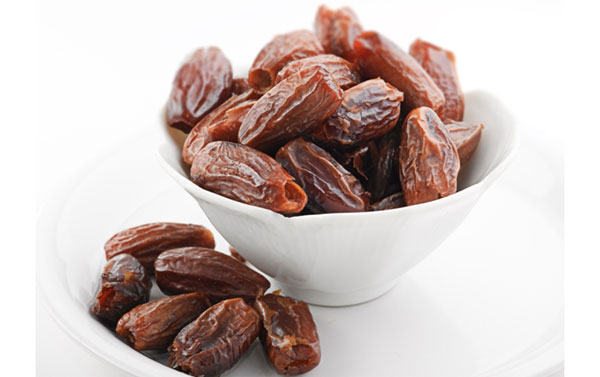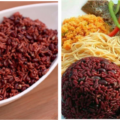Popularly known as Dabino in Nigeria, date palm (Phoenix dactylifera L.) has been known for as long as recorded history. Apart from its importance as a food source for man and animals, all parts of the plant have their use in medicine, pharmacognosy, chemistry, and religion, and in the fishing, horticulture, and construction industries. Dabino have become quite popular in recent years. Almost all Dabino are sold dried. You can tell whether or not Dabino are dried based on their appearance. A wrinkled skin indicates they are dried, whereas a smooth skin indicates freshness.
Depending on the variety, fresh Dabino are fairly small in size and range in color from bright red to bright yellow. Medjool and Deglet Noor Dabino are the most commonly consumed varieties. Dates can be eaten fresh or dried, much like raisins. People can also add them to a variety of sweet or savory dishes. Some examples of dishes that incorporate dates include:
Stuffed dates: People can stuff dates with almonds, pecans, cream cheese, or pistachios for a snack or finger food.
Salads: Chopped, sliced, or pitted whole dates are an excellent addition to salads.
Drinks: Dates are incorporated as natural sweeteners in many local drinks such as kunu, zobo, fura, and many others.
Smoothies: Blending dates into a banana smoothie adds natural sweetness and extra nutritional value.
Stews: Dates taste great in Moroccan stews or tagine dishes.
Energy balls: People can blend dates with nuts, cranberries, oats, coconut flakes, corn flakes , Golden morn or a variety of other ingredients to make no-bake “energy balls.”
Health benefits of eating Dabino (Date Palm)
1. Highly Nutritious
Dabino have an excellent nutrition profile. Since they’re dried, their calorie content is higher than most fresh fruit. The calorie content of Dabino is similar to that of other dried fruits, such as raisins and figs. Most of the calories in Dabino come from carbs. The rest are from a very small amount of protein. Despite their calories, Dabino contain some important vitamins and minerals in addition to a significant amount of fiber.
A 3.5-ounce (100-gram) serving provides the following nutrients:
- Calories: 277
- Carbs: 75 grams
- Fiber: 7 grams
- Protein: 2 grams
- Potassium: 20% of the RDI
- Magnesium: 14% of the RDI
- Copper: 18% of the RDI
- Manganese: 15% of the RDI
- Iron: 5% of the RDI
- Vitamin B6: 12% of the RDI
Dabino are also high in antioxidants, which may contribute to many of their health benefits.
2. Rich in Fiber
Getting enough fiber is important for your overall health. With almost 7 grams of fiber in a 3.5-ounce serving, including Dabino in your diet is a great way to increase your fiber intake. Fiber can benefit your digestive health by preventing constipation. It promotes regular bowel movements by contributing to the formation of stool. In one study, 21 people who consumed 7 Dabino per day for 21 days experienced improvements in stool frequency and had a significant increase in bowel movements compared to when they did not eat Dabino. Furthermore, the fiber in Dabino may be beneficial for blood sugar control. Fiber slows digestion and may help prevent blood sugar levels from spiking too high after eating. For this reason, Dabino have a low glycemic index (GI), which measures how quickly your blood sugar rises after eating a certain food.
3. Rich in Disease-Fighting Antioxidants
Dabino provide various antioxidants that have a number of health benefits to offer, including a reduced risk of several diseases. Antioxidants protect your cells from free radicals, which are unstable molecules that may cause harmful reactions in your body and lead to disease. Compared to similar types of fruit, such as figs and dried plums, Dabino appear to have the highest antioxidant content.
Profile of the three most potent antioxidants in Dabino
Flavonoids: Flavonoids are powerful antioxidants that may help reduce inflammation and have been studied for their potential to reduce the risk of diabetes, Alzheimer’s disease and certain types of cancer.
Carotenoids: Carotenoids are proven to promote heart health and may also reduce the risk of eye-related disorders, such as macular degeneration.
Phenolic acid: Known for its anti-inflammatory properties, phenolic acid may help lower the risk of cancer and heart disease.
4. Promotes Brain Health
Eating Dabino may help improve brain function. Laboratory studies have found Dabino to be helpful for lowering inflammatory markers, such as interleukin 6 (IL-6), in the brain. High levels of IL-6 are associated with a higher risk of neurodegenerative diseases like Alzheimer’s. Additionally, animal studies have shown Dabino to be helpful for reducing the activity of amyloid beta proteins, which can form plaques in the brain. When plaques accumulate in the brain, they may disturb communication between brain cells, which can ultimately lead to brain cell death and Alzheimer’s disease. One animal study found that mice fed food mixed with Dabino (Dates) had significantly better memory and learning ability, as well as less anxiety-related behaviors, compared to those that did not eat them.
The potential brain-boosting properties of Dabino have been attributed to their content of antioxidants known to reduce inflammation, including flavonoids. However, human studies are needed to confirm the role of Dabino in brain health.
5. Promotes Natural Labor
Dabino have been studied for their potential to promote and ease late-term labor in pregnant women. Eating these fruits throughout the last few weeks of pregnancy may promote cervical dilation and lower the need for induced labor. They may also be helpful for reducing labor time. In one study, 69 women who consumed 6 Dabino per day for 4 weeks prior to their due date were 20% more likely to go into labor naturally and were in labor for significantly less time than those who did not eat them. Another study of 154 pregnant women found that those who ate Dabino were much less likely to be induced compared to those who did not.
A third study found similar results in 91 pregnant women who consumed 70–76 grams of Dabino daily starting the 37th week of pregnancy. They were in active labor for an average of 4 fewer hours than those who did not eat Dabino. Although eating Dabino appears to help promote labor and reduce labor duration, more research is needed to confirm these effects. The role Dabino may have in pregnancy is likely due to compounds that bind to oxytocin receptors and appear to mimic the effects of oxytocin in the body. Oxytocin is a hormone that causes labor contractions during childbirth. Additionally, Dabino contain tannins, which are compounds that have been shown to help facilitate contractions. They are also a good source of natural sugar and calories, which are necessary to maintain energy levels during labor.
6. Good Natural Sweetener
Dabino are a source of fructose, which is a natural type of sugar found in fruit. For this reason, Dabino are very sweet and also have a subtle caramel-like taste. They make a great healthy substitute for white sugar in recipes due to the nutrients, fiber and antioxidants that they provide. The best way to substitute Dabino for white sugar is to make date paste, as in this recipe. It is made by mixing Dabino with water in a blender. A rule of thumb is to replace sugar with date paste at a 1:1 ratio.
For example, if the recipe calls for 1 cup of sugar, you’ll replace it with 1 cup of date paste.
It is important to note that although Dabino are high in fiber and nutrients, they are still fairly high in calories and best consumed in moderation.
7. Other Potential Health Benefits of Dabino
Dabino have been claimed to have a few other health benefits that have not yet been extensively studied.
Bone health: Dabino contain several minerals, including phosphorus, potassium, calcium and magnesium. All of these have been studied for their potential to prevent bone-related conditions like osteoporosis.
Blood sugar control: Dabino have the potential to help with blood sugar regulation due to their low glycemic index, fiber and antioxidants. Thus, eating them may benefit diabetes management.
Although these potential health benefits are promising, more human studies are needed before conclusions can be made.
Side Effects of Dabino (Date Palm)
When taken by mouth: Dabino is safe when used at doses of about 2-4 grams each day for 6-8 weeks. But there isn’t enough information to know if date palm fruit is safe or what the possible side effects might be when it is used in larger amounts as a medicine.
When applied to the skin: There isn’t enough information to know if date palm (Dabino) is safe to use on the skin or what the side effects might be.
Special Precautions & Warnings
Pregnancy and breast-feeding: When taken by mouth, date palm is safe in the amounts commonly found in food. But there isn’t enough information to know if it is safe in the larger amounts that are used as medicine or when used on the skin. Stay on the safe side and stick to food amounts if you are pregnant or breast-feeding.
Nevertheless individuals allergic or intolerant to dabino or its products should avoid date palms so the most common food allergy signs and symptoms include:
• Tingling or itching in the mouth.
• Hives, itching or eczema.
• Swelling of the lips, face, tongue and throat or other parts of the body.
• Wheezing, nasal congestion or trouble breathing.
• Abdominal pain, diarrhea, nausea or vomiting.
• Dizziness, lightheadedness or fainting.





